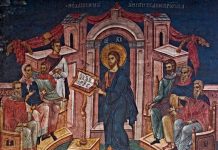Remember, remember the fifth of November. Yes, it’s Guy Fawkes Day, when the English people of a certain religious persuasion – or of none at all – celebrate – or used to anyway when religion was more to the fore in people’s minds – the foiling of the ‘Gunpowder Plot’ of 1605, when a group of Catholic conspirators planned to blow up the Parliament building with all the legislators inside, including King James I, the staunchly Protestant son of the lovely and Catholic Mary Queen of Scots. The latter had been put to death by her cousin Queen Elizabeth two decades prior, in 1587, her infant son, James,raised in the ‘new religion’. The injustice Mary’s beheading on trumped-up charges, along with devotion to the one, holy, Roman, Catholic, Apostolic Faith, was still fresh in people’s minds.
Some of the conspirators developed qualms of conscience – since a few of said legislators about to be blown to British bits were Catholic – and they sent at least one of them a warning, which was intercepted. The King’s Men searched under the building, and discovered 30 or so barrels of gunpowder in an unused, subterranean room, guarded by one Guy Fawkes, a Catholic soldier-at-arms who had helped mastermind the whole fiasco, ready to light the fuse and escape by swimming across the Thames.
All rather daring but, as much as I love a good adventure story, likely immoral. Guy, a robust man of red hair and commanding mien, but who in all probability looked little like the ‘masks’ seen in such Hollywood swill as ‘V for Vendetta’, was duly tortured, eventually confessed and implicated others, but, as it was reported, escaped being hung and quartered by falling (or some say, jumping) off the scaffold and breaking his neck. Requiescat in pace.
To this day, effigies of ‘Guy Fawkes’ are burned across what used to be the British empire, calling to mind the triumph and glories of Protestant England, and the downfall of obscurantist and seditionist ‘Papism’. Or something like that.
The truth, as is usually the case, is far more complex, with religion is those days tied up so closely with politics, allegiances, culture, wars, with the fate of peoples and whole nations hanging in the balance. The ‘Reformation’ more or less destroyed what we know as mediaeval and merrie Catholic England, by practices often too gruesome to describe, in an age in some ways more brutal, or, I should qualify, more externally brutal, than ours; the stakes were high.
We should think, and think deeply, as did Saint J.H. Newman, about what religion we adopt, for that which is, as Saint Thomas says, the ‘master of our affections’ will colour and motivate everything else we do, and will determine our ultimate eternal destiny.
And, while we’re on the way there, we should also ponder how religion shapes our society, for it will, for good or ill. Only the ‘one, true religion’ can fully instantiate the common good, and lead not only to a fulfilled life, but to a prosperous and cohesive nation.










